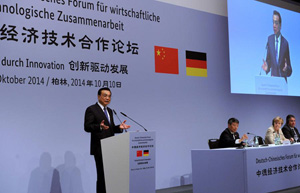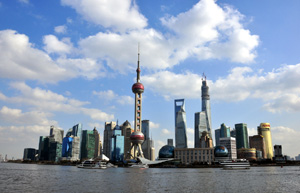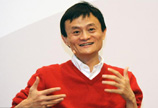China, US 'bright spots' in fragile global economic recovery
(Xinhua) Updated: 2014-10-11 15:51WASHINGTON - China and the United States are "bright spots" in a slowly improving but fragile global economic recovery, Chinese Vice Finance Minister Zhu Guangyao said here Friday.
"Six years after the start of the global financial crisis, the pace of world economic recovery remains slow," Zhu told Xinhua after a meeting with finance ministers and central bank governors of the Group of 20 (G20), which was held on the sidelines of the ongoing Annual Meetings of the International Monetary Fund (IMF) and the World Bank.
Zhu said the IMF had lowered its global economic growth forecasts for this year to 3.3 percent, seeing vulnerabilities built up in the euro area and Japan, but upgraded its outlook for United States and kept its forecast for China unchanged.
This "sharp contrast" indicated that China and United States were "bright spots" of the global recovery, he said.
China would contribute 27.8 percent to total world GDP growth this year and the US could add another 15.3 percent, if China's economy grows 7.4 percent for the whole year and the US economy grows 2.2 percent as estimated by IMF, Zhu explained, adding that the two economies have become the two largest contributors to global economic growth.
Zhu reiterated that China had potential to keep its growth in proper range and would stick to the reform strategy to achieve quality growth. "A steady, healthy and sustainable growth in China will benefit both the country and the world," he said.
Zhu also hoped the Asia-Pacific Economic Cooperation (APEC) informal leaders' meeting and G20 leaders' summit to be held next month could help reinforce confidence in the global outlook and put the world economy back on track.
Almost 1,000 measures had been proposed by G20 members that would boost global growth by an additional 2 percent over five years, and 15 percent of which were from China, Zhu said.
China could contribute as much as 30 to 40 percent to the G20's 2 percent extra growth target by structural reform, if quantitative analysis could be used to assess the investment, trade, employment and competitiveness, Zhu said, highlighting its crucial role in promoting global growth.
Zhu said the G20 also discussed the unwinding of monetary stimulus in the United States, a heated topic in the financial markets which triggered volatility in emerging market economies.
"The Federal Reserve is on track to end the asset purchase program at its next policy meeting on Oct 28-29, but there will be a big challenge for the Fed to decide the timing of first interest rate hike," he said. The Fed has kept its benchmark short-term interest rate near zero since December 2008.
Zhu said US and Chinese officials had been in good coordination in terms of the central bank's policy intention.
China will "watch closely" the spillover effects of Fed's future interest rate hikes and keep stability in its financial markets, Zhu said, noting that changes in US interest rates could reverberate through the global financial system and the world economy.
Zhu also urged the United States to approve the IMF 2010 quota and governance reform package, calling it "a shared commitment to global economic governance reform."
Finance ministers and central bank governors of the G20 urged the US Congress to approve the reform package "as soon as possible," he said, adding that the United States should not fall short of meeting its responsibility.
|
 |
 |
| Li says China able to keep around 7.5% growth | Key think tank scales back outlook for 2014 |
- Less but better growth for China: IMF chief economist
- China to become biggest economy by year-end
- Experts: Bright times ahead for Sino-US trade and investment
- Economic woes crimp steel demand
- China's September economic activity to increase
- Chinese economy plays vital role globally: WTO economist
- China economy still faces a long march
- China's economy likely to hit 5-year low in Q3
- Hamburg summit focuses on promoting China-Europe investment
- US approves anti-dumping probe of boltless steel shelving from China
- German business leader pleads for barriers removal in China-Europe trade
- Tax-free purchases by Chinese tourists in Latvia double
- AVIC International launches real estate project in Sri Lanka
- Russia formally approves gas deal with China
- Li says China able to keep around 7.5% growth
















